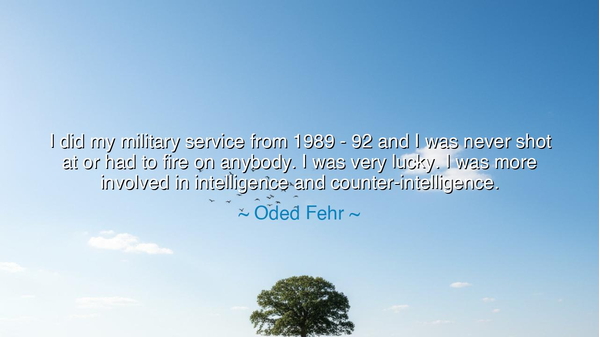
I did my military service from 1989 - 92 and I was never shot at
I did my military service from 1989 - 92 and I was never shot at or had to fire on anybody. I was very lucky. I was more involved in intelligence and counter-intelligence.






Here is an ancient-style reflection on Oded Fehr’s quote:
The Quiet Battle Within
When Oded Fehr said, “I did my military service from 1989–92 and I was never shot at or had to fire on anybody. I was very lucky. I was more involved in intelligence and counter-intelligence,” he spoke with the humility of a man who knows that survival is not always measured in victories, but in the grace of having been spared. His words echo softly, yet powerfully, through the ages — a reminder that not all wars are fought with bullets, and not all warriors bear visible scars. In them lies a quiet reverence for the fragile gift of peace, and an acknowledgment that wisdom, not violence, is the highest form of strength.
The meaning of his words extends beyond the tale of one soldier. Fehr speaks of fortune, of the sacred balance between duty and fate. Many who have served in war know the chaos of combat — the thunder of guns, the loss of comrades, the haunting silence afterward. Yet Fehr’s path was different: his war was one of intelligence, of knowledge and strategy, where battles were fought not on fields of blood, but in the shadowed corridors of the mind. He understands that luck alone cannot explain survival; rather, it is the unseen interplay between destiny and discernment, between courage and restraint, that allows a man to walk away whole.
The origin of his reflection lies in a time of conflict, when his homeland — Israel — stood amidst tension and uncertainty. During those years, military service was a rite of passage, a crucible in which young men and women faced both fear and responsibility. Fehr’s role in intelligence and counter-intelligence speaks to a deeper truth: that the greatest battles of the modern age are often those unseen by the public eye. The spies, the analysts, the watchers in the shadows — they guard not through destruction, but through understanding. Their victory lies in prevention, in ensuring that the shot never needs to be fired.
Throughout history, the wisest leaders have recognized the supremacy of the mind over the sword. Consider the tale of Sun Tzu, the ancient strategist of the East, who taught that “the supreme art of war is to subdue the enemy without fighting.” He knew that intelligence — the mastery of knowledge, perception, and foresight — was the true heart of power. His teachings echo in Fehr’s words, for both men understood that survival without violence is not cowardice; it is mastery of self and circumstance. The warrior who avoids the fight has not fled — he has transcended.
And yet, Fehr’s statement also carries the weight of gratitude. “I was very lucky,” he says — not as a boast, but as a prayer. In those few words lies the awareness of how thin the veil between life and death can be, and how every spared breath is a gift. The ancient poets would have called this the wisdom of those who return from the threshold — the understanding that peace is not to be taken for granted, but to be cherished and guarded like a sacred flame. The one who has seen the edge and come back speaks softly, for he knows how easily the world can burn.
His reflection reminds us that true service is not measured in glory, but in purpose. The world celebrates the warrior with the sword, but seldom the one who protects with intellect, who prevents rather than destroys. Yet history shows that empires endure not because of their armies, but because of their thinkers, diplomats, and guardians of knowledge. The strength of a civilization lies not in its power to fight, but in its ability to preserve life through wisdom and restraint.
Therefore, O listener, take this lesson into your own life: fight your battles with intelligence before you raise your hand in anger. Seek understanding before judgment, and foresight before reaction. Whether in your home, your work, or your heart, remember that the greatest victories are those won without harm. Be grateful for peace when it finds you, and protect it fiercely when it does.
For the measure of greatness, as Oded Fehr teaches, is not how many battles one survives, but how many one prevents. The mind is the truest weapon, and wisdom the noblest shield. And so, as you walk through your own struggles, may you remember this eternal truth: the greatest strength is not in conquering others, but in mastering oneself — and choosing peace when war is possible.






AAdministratorAdministrator
Welcome, honored guests. Please leave a comment, we will respond soon